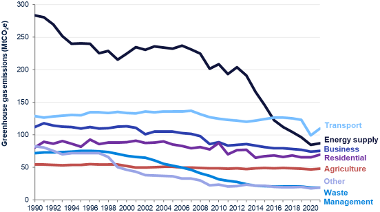Sustainable travel
Electric vehicles
A transition to electric vehicles is almost inevitable following the Government's announcement in 2020 that the sale of new petrol and diesel cars and light vans will be phased out by 2035, with the sale of non-hybrid models ending by 2030. Electric vehicles already have significantly lower greenhouse gas emissions over their lifetime, and this advantage will only increase as the electricity grid is decarbonised.
The upfront cost of electric cars is still substantially higher than traditional petrol or diesel vehicles, but with much lower "fuel" costs and lower maintenance costs, electric cars are likely to be saving you money overall after around 5 - 8 years of ownership.
Electric vehicle charging points are currently provided in Walpole Park Car Park and we are looking into installing charging points in other car parks. There are also several charging points provided by companies such as supermarkets, pubs and service stations - check out Zap-Map for a comprehensive list with live status updates for most points.
The Government provides grants to homeowners living in flats, renters in all types of property, and landlords, to support installation of domestic charging points. Even if you don't have off-street parking, in many cases charging from your domestic electricity will still be possible. For those unable to charge from home, Hampshire County Council are rolling out on-street charging points. Please let them know where you would like to see a charging point, as they are keen to understand where the demand is and will be using this to decide how to prioritise the rollout.
Zero-emission vehicles will go some way to help, but it's important to understand that they are only part of the solution. Simply replacing existing vehicles with electric ones, while attempting to maintain our current driving habits, will make it much harder to decarbonise the electricity network, and also won't address other issues such as congestion, or the health impacts of inactivity. Fortunately, there are many ways we can travel more sustainably.
Travel less
With a bit of planning ahead, it's often possible to combine several destinations into a single journey. Lift sharing schemes are an easy way to reduce the number of vehicle miles. We can also reduce the distance we travel for work and holidays, by using video conferencing wherever possible to avoid business flights and by supporting our tourism industry with holidays in the UK.
Active travel
Walking and cycling are great for our physical and mental health. Not only do we benefit from being more active, we also suffer less from pollution - car drivers are exposed to twice as much pollution as pedestrians and nine times as much as cyclists. Gosport has an extensive network of off-road routes which make cycling and walking easy for shorter distances. If you regularly travel that bit further, an ebike could be the ideal solution.
Public transport
Most parts of Gosport are well connected by bus, with the Bus Rapid Transit route providing easy access to Fareham train station. And of course the Gosport Ferry is the quickest way to get into Portsmouth, with many bus routes serving the ferry terminal.
Green driving
When you do have to drive, there are several simple measures you can take to reduce your emissions. Most of these address reducing weight and drag and driving smoothly, and are equally applicable whether your car is fully petrol/diesel, hybrid, or fully electric.
A3 EV Grant Scheme for Businesses, Charities and Organisations
What is it?
The A3 EV grant is a grant funding programme offering grants to help organisations switch their diesel van to a new electric van. To be eligible they need to drive 150 journey a year on the A3 section between Woodbridge Hill A25/A322 junction and A31 to Farnham junction. Financed by National Highways and delivered in partnership with Surrey County Council and Guildford Borough Council. It is part of Electric Towns and Cities initiative (ETCI)- Guildford, which also includes a rapid EV charging network and active travel programme. These initiatives are being put in place to lower the air pollution on the A3 in Guildford.
Who is it for?
Businesses, charities, organisations trading for at least 2 years in the UK who own or lease a diesel van for at least 1 year and drive at least 150 journeys a year on the highlighted A3 section and have received less than £315,000 in subsidy in the last 3 years.
What can they get?
£5,000 grant against a small new electric van from eligible vehicle list, purchased through an accredited dealer
£10,000 grant against a medium or large new electric van from eligible vehicle list, purchased through an accredited dealer
Where do they find more information and apply?
Who to contact?
The grant management team can be contacted on etciqueries@surreycc.gov.uk





